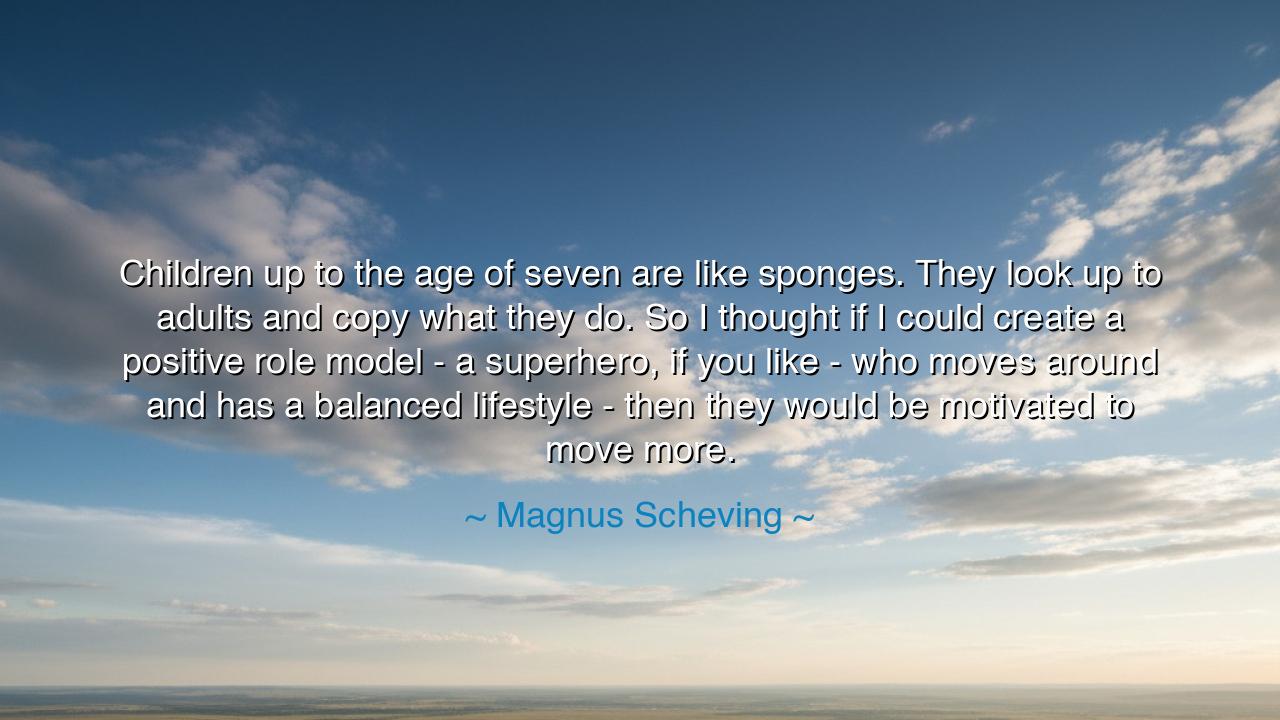
Children up to the age of seven are like sponges. They look up
Children up to the age of seven are like sponges. They look up to adults and copy what they do. So I thought if I could create a positive role model - a superhero, if you like - who moves around and has a balanced lifestyle - then they would be motivated to move more.






When Magnus Scheving proclaimed, “Children up to the age of seven are like sponges. They look up to adults and copy what they do. So I thought if I could create a positive role model—a superhero, if you like—who moves around and has a balanced lifestyle—then they would be motivated to move more,” he revealed a truth as ancient as humanity itself: that the young are shaped not by words alone, but by the living examples they behold. His vision was not merely to entertain, but to guide, planting seeds of health and vitality in tender souls.
The ancients knew well the power of imitation. Aristotle taught that the child learns virtue by mirroring the habits of elders, just as a sculptor learns his art by studying the master’s chisel. To say children are like sponges is to echo this eternal truth: they absorb the actions, values, and rhythms of those around them, and what they absorb becomes the foundation of their lives. Thus, to offer them a positive role model is to shape the future of society itself.
History offers luminous examples. Consider the tale of Hercules—not only a hero of strength, but of labor, endurance, and courage. For the youth of Greece, his deeds stood as a mirror of what was possible: to rise above weakness and embrace noble struggle. In the same way, Scheving sought to craft a modern superhero, not to slay monsters, but to battle idleness and inspire movement. His creation becomes a parable: when the young see joy in motion and balance in life, they are drawn to follow it.
The wisdom here is also practical: for what is preached without example soon withers, but what is lived before the eyes of the children endures. A teacher may tell of health, but if his own life is stagnant, the lesson is hollow. Yet when the elder moves, smiles, and embodies harmony, the young absorb it as naturally as breathing. In this, Scheving’s insight is heroic, for he recognized that to change the lifestyle of the next generation, one must first model the change with courage and joy.
Therefore, let this teaching be passed on: the early years are sacred ground, soft clay in the hands of those who guide. To give children heroes who embody goodness, vitality, and balance is to prepare a future of strength. A single positive role model can set aflame a thousand young hearts, and from their imitation may arise a generation more resilient, more joyful, and more whole than the last.






TQTien Quan
I agree that children learn a lot by mimicking adults, and using a superhero as a positive role model is a great way to instill healthy habits early on. The idea of a superhero living a balanced lifestyle helps convey the message that health is fun and important. But in a world filled with so many entertainment options, how can we make sure that kids don’t just idolize the superhero but also adopt the behaviors they see in a meaningful way?
TTTrung Tran
Magnus Scheving's concept of a superhero promoting movement and a balanced lifestyle is a clever way to influence young children. The idea that kids look up to adults and mimic their actions is well known, and using that to create a positive, active example is a fun and effective approach. But what other strategies can we combine with this superhero approach to ensure that the message of health and balance really sticks with children as they grow?
AVNgoc Anh Vu
I love the idea of using a superhero to inspire children to adopt a balanced lifestyle. At that young age, children are highly impressionable, so giving them a positive role model who encourages physical activity is a great strategy. But do you think there’s a risk of creating an unrealistic expectation of what health and fitness should look like? How can we balance promoting healthy habits while also ensuring kids understand that everyone’s journey is unique?
TDThuy Duong
This quote highlights a key point about the importance of role models in early childhood development. Children are heavily influenced by the behavior of adults, and using a superhero to promote a healthy lifestyle is a fun and engaging way to get them moving. But how do we ensure that these positive behaviors stick as they grow older and encounter less ideal influences in the world? Can we rely on just role models, or should we also teach children the value of self-discipline?
VANgo Van An
I completely agree with the idea that children are like sponges up until the age of seven. They absorb everything they see around them, which is why it's so important to set a good example. Creating a superhero who embodies a balanced lifestyle is a brilliant way to encourage movement. How much impact do you think a role model like this can have on kids today, especially with so many distractions like screen time?